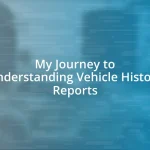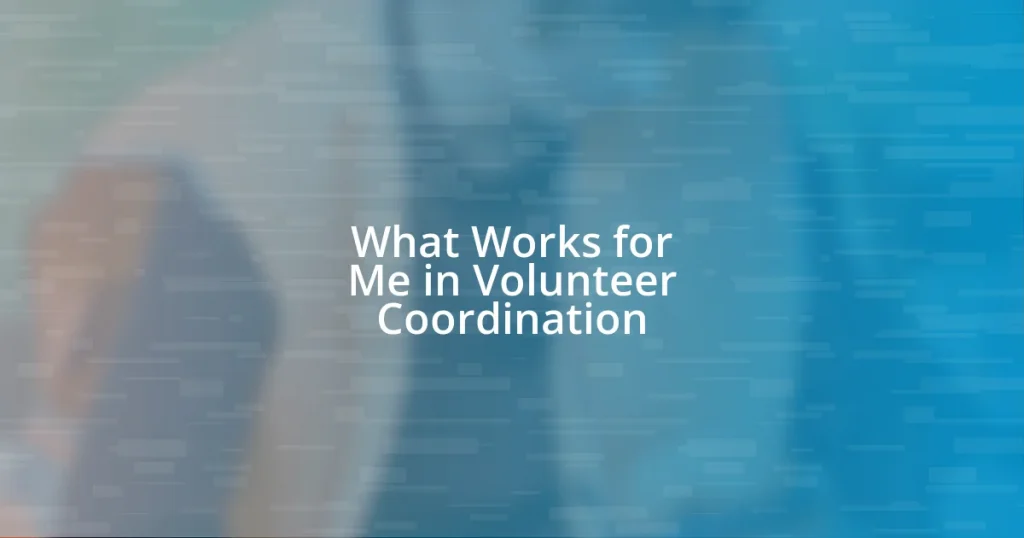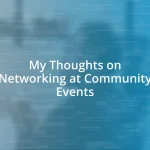Key takeaways:
- Effective volunteer coordination involves building a community through understanding, empathy, and empowering communication.
- A successful volunteer recruitment strategy includes tailoring outreach methods, engaging storytelling, and creating opportunities for direct interaction.
- Celebrating and recognizing volunteer contributions enhances engagement and builds a stronger sense of belonging within the volunteer community.
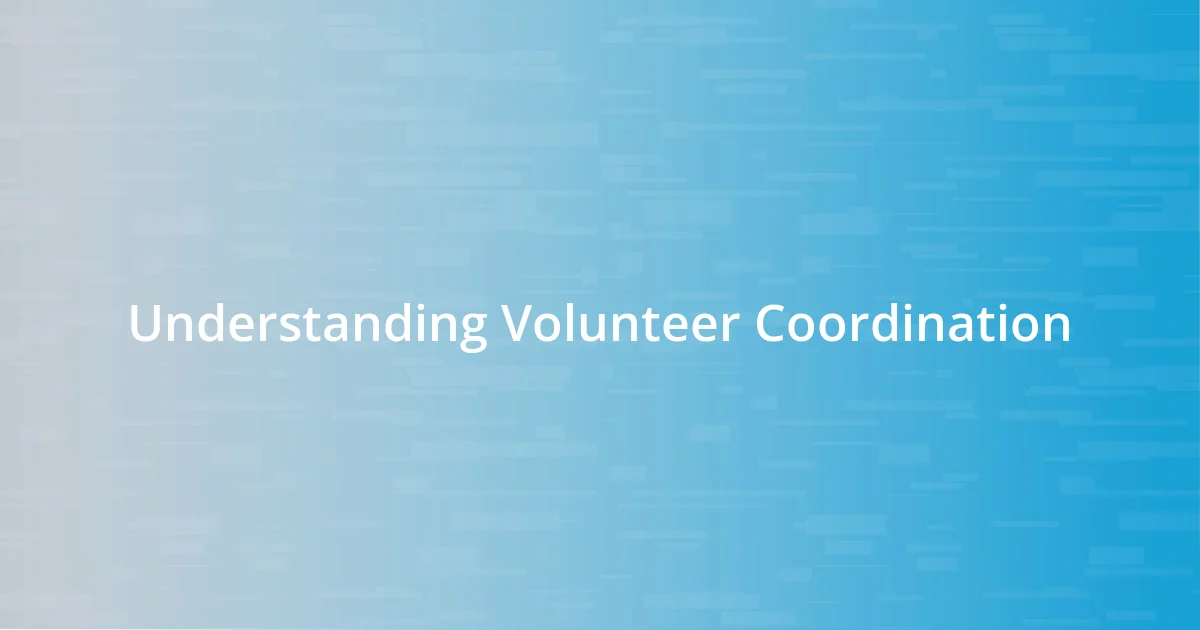
Understanding Volunteer Coordination
Understanding volunteer coordination is about more than just managing schedules; it’s about creating a community. I remember the first time I organized a volunteer event. I was nervous, thinking about how to communicate with so many diverse individuals. But as the day unfolded, I realized that the real essence of coordination lies in forging connections and understanding the unique motivations of each volunteer.
It’s crucial to remember that volunteers come with different experiences and expectations. Have you ever wondered what drives someone to dedicate their time to a cause? For me, it was a personal connection to a local charity supporting children in need. This personal history made my coordination approach more empathetic; I strived to create an environment where every volunteer felt valued and understood, ensuring we all shared a common goal.
In my experience, effective communication is the backbone of volunteer coordination. Often, I find myself asking for feedback, which not only empowers volunteers but also enriches the overall experience. Reflecting on past events, I’ve learned that listening and adapting to the needs of the team not only enhances efficiency but fosters a sense of belonging. Isn’t that what we all seek in our work?
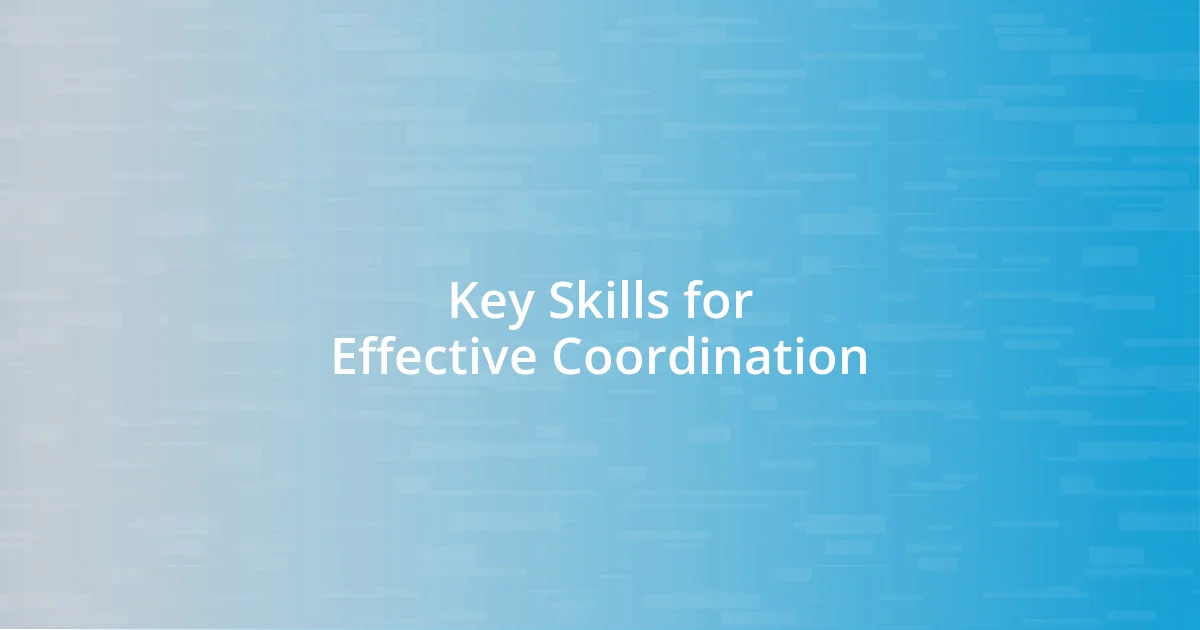
Key Skills for Effective Coordination
When it comes to effective coordination, a blend of essential skills can make a world of difference. For me, adaptability stands out as one of the key components. There have been times during volunteer events when plans went awry—whether due to unexpected weather changes or a sudden surge in volunteer turnout. In those moments, my ability to adapt on the fly not only reassured the volunteers but also kept our activities running smoothly. It’s fascinating how a flexible mindset can turn potential chaos into a cohesive team effort.
Here are some vital skills that significantly enhance volunteer coordination:
- Communication Skills: Clearly articulating tasks and listening to feedback helps foster an open environment.
- Empathy: Understanding each volunteer’s motivations allows for a more tailored approach to their involvement.
- Organization: Keeping track of schedules, materials, and tasks ensures that everyone knows what to expect.
- Conflict Resolution: Being prepared to mediate disagreements or misunderstandings can maintain harmony within the group.
- Motivational Skills: Inspiring volunteers by recognizing their efforts fosters a deeper commitment to the cause.
Every interaction I have as a coordinator becomes an opportunity to practice these skills. For instance, during a recent project, I noticed a volunteer looking disengaged. By taking a moment to check in with her, I learned about her personal struggles with the job. Together, we brainstormed ways she could contribute that aligned better with her interests, and it transformed her experience. It’s these moments that remind me how much our roles as coordinators extend beyond just logistics—they’re about connecting and nurturing a passion for the cause.
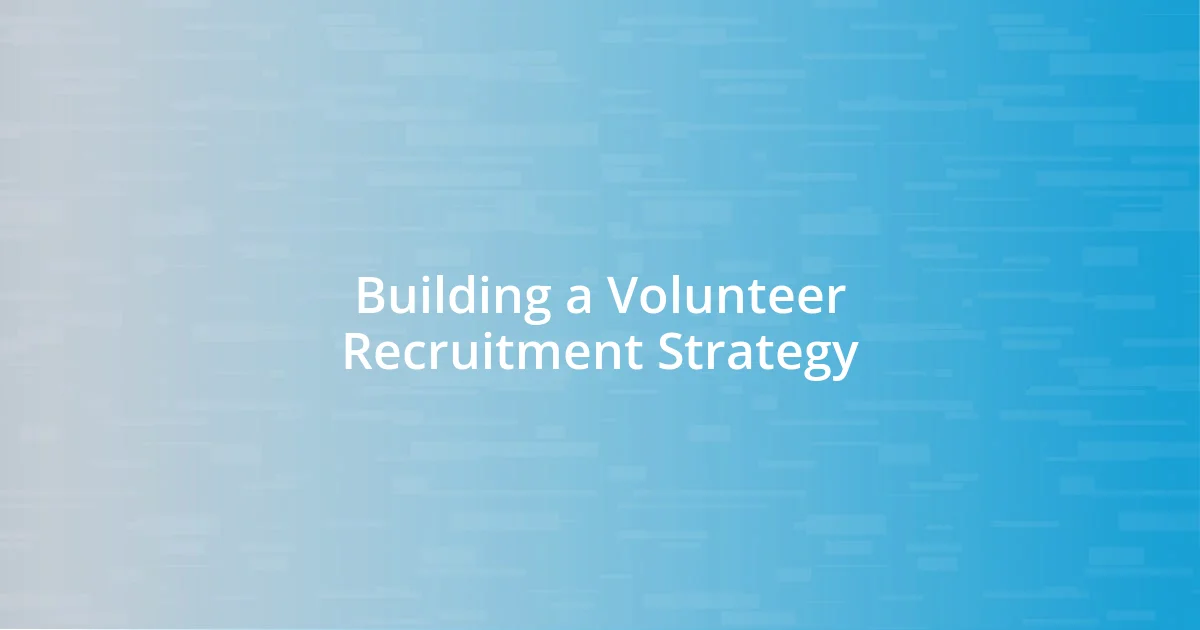
Building a Volunteer Recruitment Strategy
Building a volunteer recruitment strategy is like planting seeds for a brighter future in your community. I’ve personally discovered that attracting the right volunteers starts with understanding where to look. From social media platforms to local community centers, each avenue presents unique opportunities, but what truly matters is tailoring your approach based on the interests of your target audience. For instance, when crafting a call for volunteers, incorporating personal stories about the impact of their work can be incredibly effective. I once shared a heartfelt testimonial from a community member about how volunteers changed her life, and the response was overwhelming.
It’s essential to also consider the timing and messaging of your recruitment efforts. I recall hosting a recruitment event on a busy weekend when many potential volunteers were already committed elsewhere. I learned that coordinating efforts with community activities—like fairs or local festivals—provided a more effective platform for engagement. A vibrant setting not only attracts attention but also creates an inviting atmosphere to spark conversations. The more lively and relatable the event feels, the more likely you are to engage those who may be hesitant to volunteer.
Lastly, fostering a sense of belonging is crucial. In one of my earlier recruiting drives, I realized too late that I hadn’t adequately communicated the impact volunteers could make. It struck me that sharing specific roles and their contributions helps build excitement and ownership among potential volunteers. Turning this idea into practice, I made it a point to invite previous volunteers to share their experiences in subsequent recruitment efforts. Seeing the genuine enthusiasm in their storytelling transformed how new recruits viewed their potential impact, and it instilled a sense of community that brought people together.
| Recruitment Avenues | Effectiveness |
|---|---|
| Social Media | Broad reach; engages younger demographics |
| Community Events | Direct interaction; builds personal connections |
| Email Campaigns | Reaches existing supporters; costs less |
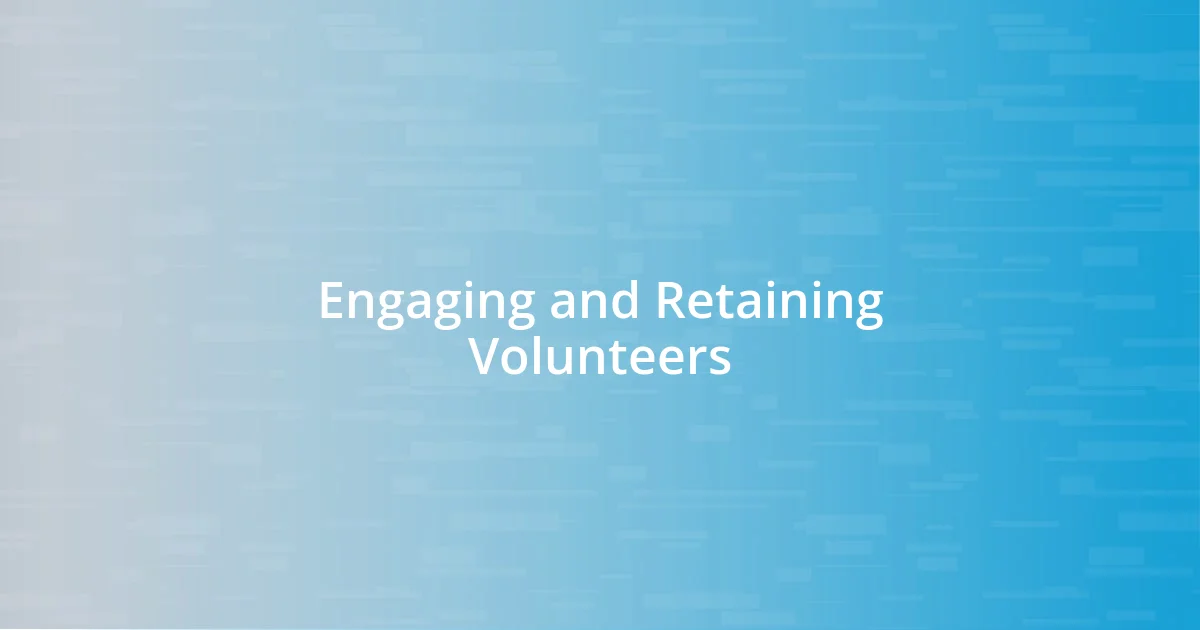
Engaging and Retaining Volunteers
Engaging and retaining volunteers is an art that I’ve come to appreciate deeply over the years. One effective strategy I’ve found is to create meaningful connections right from the start. During a community clean-up event, I took the time to share my own story about why I care so much about our local parks. As I spoke, I noticed volunteers nodding, their expressions lighting up in understanding. It made me wonder—don’t we all crave that sense of belonging and purpose? When volunteers know they’re part of something bigger, they often stay committed long after the event ends.
Recognition plays a pivotal role as well. I remember organizing a small appreciation dinner for our volunteers after a large event. The smiles on their faces as they shared their experiences made me realize how much a simple “thank you” can mean. It’s not just about acknowledging hard work; it’s about celebrating every individual’s contribution. I often ask myself: how can we create an environment where volunteers feel valued? Tailoring appreciation efforts—from shout-outs on social media to personalized notes—reinforces their importance within the team and cultivates long-term loyalty.
Lastly, providing opportunities for skill development has proven invaluable in retaining volunteers. For instance, I once guided a group of volunteers in a workshop on project management skills. To my surprise, many of them expressed an interest in leading future initiatives. This not only fostered a sense of ownership but also empowered them to step outside their comfort zones. It’s fascinating to think about how investing in volunteers’ growth can transform them into passionate advocates for your mission, isn’t it? By aligning their personal goals with the organization’s objectives, you’re creating a win-win situation that encourages sustained engagement.
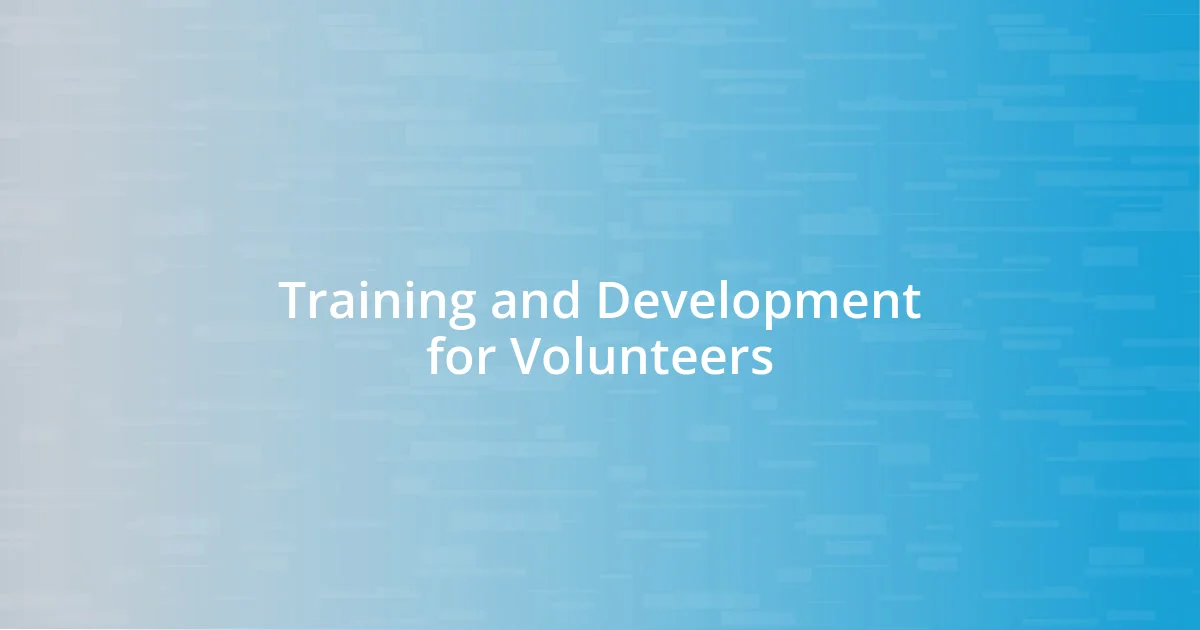
Training and Development for Volunteers
Training and development for volunteers is a critical element I’ve observed in fostering commitment and skill growth. I once organized a training session that focused on both the mission of our organization and practical skills volunteers would use on the ground. Participants were surprised by how much they learned, from conflict resolution to effective communication strategies. Seeing their faces light up during interactive role-playing exercises reminded me that training doesn’t have to be tedious; it can be an exciting opportunity for growth.
When developing training programs, I find it essential to listen to volunteers’ feedback. After one workshop, I encouraged everyone to share their thoughts. To my delight, several volunteers suggested additional topics, like social media outreach or event planning. This moment underscored a significant lesson for me: when volunteers feel empowered to influence their training experiences, they’re more likely to engage positively. I’ve learned that the best training sessions arise from collaboration, making everyone feel invested in their development.
Moreover, continuous development doesn’t end once volunteers complete initial training. I’ve implemented mentorship programs where new volunteers can partner with experienced ones. This has not only strengthened relationships but also provided ongoing learning opportunities. Reflecting on my own journey, I realize that having a mentor made a world of difference early in my volunteering experience. Isn’t it incredible how sharing knowledge can foster a stronger community? Each exchange contributes to building a vibrant environment that encourages both personal and organizational growth.
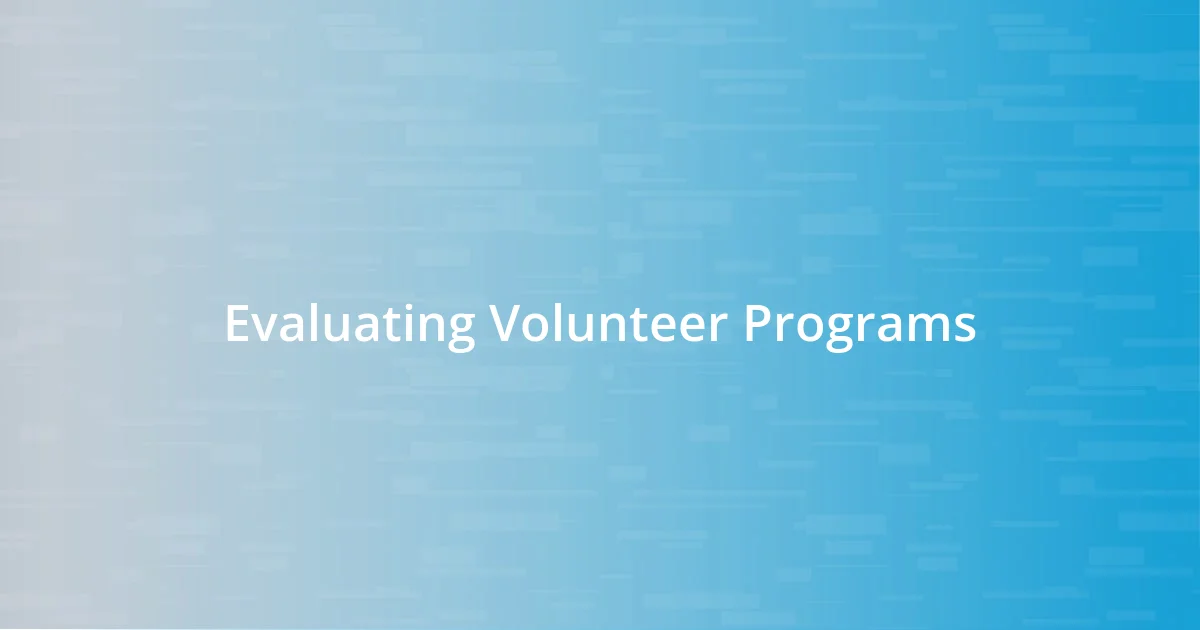
Evaluating Volunteer Programs
Evaluating volunteer programs can sometimes feel like navigating a maze, but I find it crucial to measure effectiveness periodically. One practical approach I adopted was setting clear, measurable goals at the outset. For instance, after implementing a new volunteer initiative, I gathered data on attendance, engagement levels, and volunteer feedback. This information painted a clearer picture of what was working and what needed adjustment. I often ponder: how can we truly know if we’re making a difference without the right metrics?
The feedback collected during evaluations is not just numbers; it’s filled with rich stories and insights that reveal volunteers’ experiences. During one assessment, a volunteer shared how a specific project impacted their personal life, igniting a sense of purpose that they hadn’t anticipated. Moments like this resonate deeply with me. They remind me that evaluation isn’t merely about statistics; it’s about understanding the human stories behind those figures. How can we ignore the emotional landscape that shapes our volunteer community?
In addition, I recommend creating a culture of continuous improvement, where feedback isn’t just welcomed but actively sought. After an event, I often send out brief surveys to gauge volunteer satisfaction and identify areas for growth. One time, a quiet volunteer expressed a desire for more leadership opportunities through the survey, which led to the creation of a training workshop focused on leadership skills. This not only empowered that volunteer but also enriched the entire team. It’s fascinating to see how making evaluations a collaborative effort can transform volunteer programs, isn’t it?
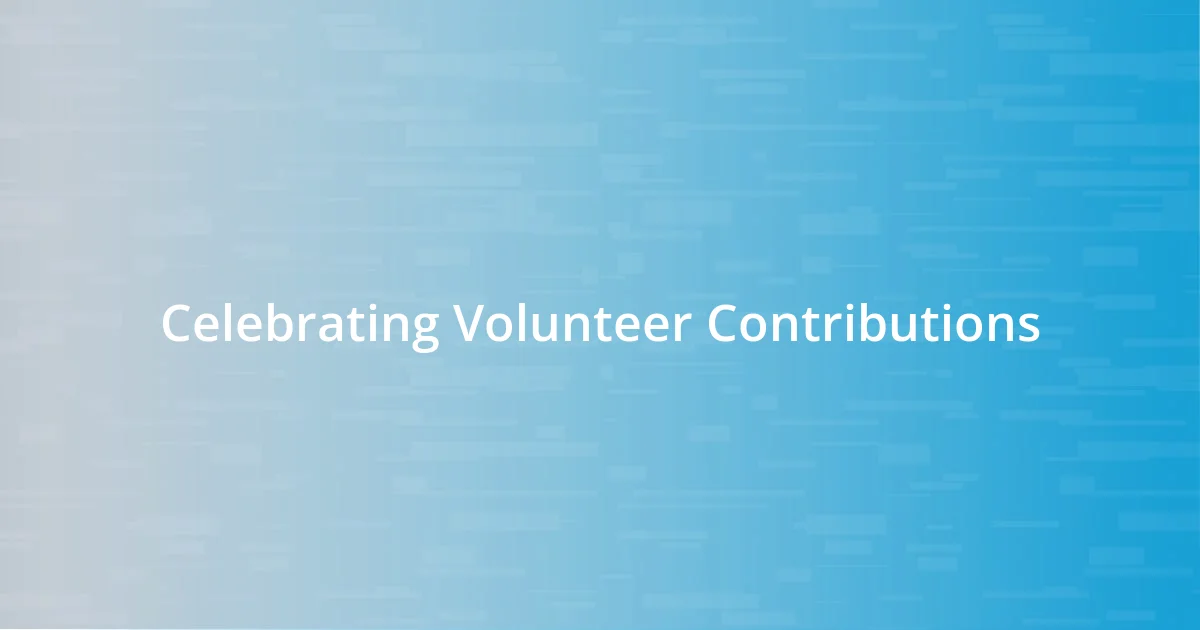
Celebrating Volunteer Contributions
Celebrating the contributions of volunteers is one of the most rewarding aspects of coordination. I remember organizing a small appreciation event for our dedicated volunteers. The energy in the room was infectious as we shared stories of impact and growth, honoring both individual efforts and collective achievements. It struck me how such gatherings not only validate hard work but also foster lasting connections among participants. Why wait for a major milestone when every volunteer deserves recognition?
In my experience, personalized acknowledgments often resonate more than generic awards. Last year, I decided to write handwritten thank-you notes to each volunteer, highlighting specific contributions they made. The smiles and surprise on their faces made it clear—people love being seen and valued for their unique talents. It’s a simple yet profound gesture that can elevate a volunteer’s experience significantly. Isn’t it fascinating how a few thoughtful words can inspire someone to continue giving their best?
Moreover, I’ve found that showcasing volunteers on our social media platforms has a dual benefit: it celebrates their contributions while inviting others to join our mission. Featuring stories and photos of volunteers in action brings their experiences to life, creating a sense of community and belonging. When I posted about a volunteer who organized a successful fundraiser, the response was incredible—both from the community and other potential volunteers. It reminded me of the powerful ripple effect recognition can create, isn’t it time we shine a light on those who make a difference?







